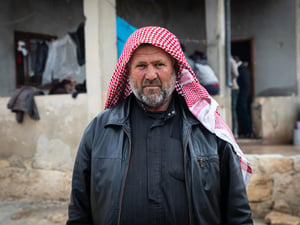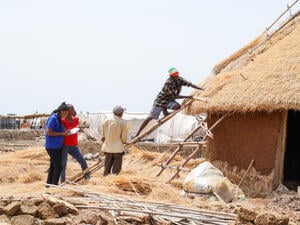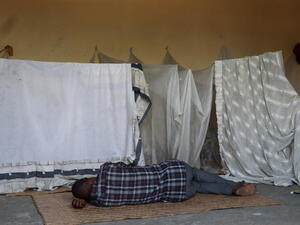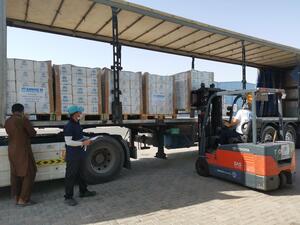Shelter needs acute in northern Iraq as UNHCR steps up aid operation
Shelter needs acute in northern Iraq as UNHCR steps up aid operation

A group of internally displaced Iraqi girls queue for food at a community kitchen in a village in Iraqi Kurdistan's Dohuk governorate.
GENEVA, September 5 (UNHCR) - As the UN refugee agency continues a major aid operation for almost half a million displaced people in northern Iraq, pressure on accommodation remains acute. "Many schools are still being used to house the displaced. In addition, there is urgent need to reinforce tents and other housing in preparation for the coming winter," UNHCR spokesman Adrian Edwards told journalists in Geneva.
UNHCR's air, road and sea aid push launched on August 20 has included tents, but more are needed. Over the next few days 10 further aid flights will be arriving at Erbil in Iraq's Kurdistan, where an estimated 850,000 people have sought safety after fleeing their homes.
The new airlift, supported by the people and government of Norway, will bring close to 40,000 blankets, 10,000 kitchen sets, and almost 18,000 plastic sheets. Since mid-June, UNHCR and its partners have provided more than 100,000 mattresses, 10,000 family tents and 40,000 jerry cans and tens of thousands of other items.
"At present, new displacement has diminished. However, with ongoing fighting in Ninewa, Diyala, Anbar, and Saladin governorates, the situation remains unpredictable," Edwards said. "Aid needs remain far-reaching; in addition to shelter and emergency items - food, medical care and education are priorities," he added.
UNHCR is also supporting displaced people in central and southern Iraq, "where we have reached nearly 120,000 people across 15 governorates since January. Emergency aid kits, have been pre-positioned in case of further need in Amerli in Salah al-Din governorate," Edwards said.
At present there are eight camps across Iraq, housing close to 40,000 displaced people. UNHCR is providing help, including tents and emergency aid. Nineteen other camps are under consideration, being designed and constructed by regional authorities and aid agencies. UNHCR is supporting some of that work. The agency will also be providing tents, emergency aid and protection support as needed.
However, most of the displaced are not living in camps, and many are still in collective centres, unfinished buildings, mosques, churches and schools. More than 2,000 schools countrywide are being used to house the displaced, making it likely that the start of the school year, currently scheduled to begin in less than two weeks, will be delayed.
"People living in schools are being prioritized for movement to new camps as they open. There remains a pressing need for a solution to the shelter crisis, as it is unlikely that security will improve sufficiently over the coming weeks for large numbers of people to be able to return to their homes," UNHCR's Edwards said.
As well as emergency aid, UNHCR is providing cash assistance to help those in rented accommodation. To date, this has benefitted some 12,000 people (1,990 families). "By the end of the year we expect to help close to 50,000 people with cash support. Cash support enables people to buy what they view as being most important; quite often, some of it goes toward rent. We are also working on rehabilitating damaged housing," Edwards noted.
Time is now of the essence in providing support to Iraq's displaced. Winter is approaching fast, with snow, rain and muddy conditions. In less than three months from now, daily temperatures will average less than 10 degrees Celsius, and the rains will begin. UNHCR has already released 20,000 additional family tents, but more warm clothing and heaters will also be needed.
Across Iraq, an estimated 1.8 million people have been displaced since January. They are spread around some 1500 sites across the country. Iraq is also hosting 215,000 Syrian refugees.
Edwards also stressed that UNHCR urgently needs more financial support to be able to meet the needs of forcibly displaced people and host communities across Iraq. As part of the UN humanitarian relief effort, UNHCR will soon launch an appeal for US$315 million to meet the needs of the internally displaced in Iraq. The main focus will be on providing life-saving protection services and assistance to respond to the most urgent basic needs of displaced Iraqis, including winterization support.








